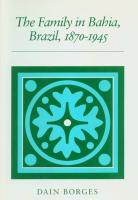Associate Professor Emeritus of History, Romance Languages & Literatures, and the College
dborges@uchicago.edu
773.834.0284
PhD, Stanford University, 1986
Dain Borges works on nineteenth- and twentieth-century Latin American culture and ideas. His current research project, "Races, Crowds, and Souls in Brazilian Social Thought, 1880-1920," centers on the ways in which Brazilian intellectuals used race sociology and social psychology to understand popular religion and politics. He teaches seminars and courses on Latin American history, comparative nineteenth-century transformations, ideologies of national identity, and culture in the African diaspora.
Publications
- “Mockery and Piety in Eça de Queirós and Machado de Assis,” Revista de Estudos Literários [Coimbra] 6 (2016): 95-113.
- "Healing and Mischief: Witchcraft in Brazilian Law and Literature, 1890–1922." In Crime and Punishment in Latin America. Edited by Carlos Aguirre, Gilbert Joseph, and Ricardo Salvatore. Durham: Duke University Press, 2001.
- Esau and Jacob, by Machado de Assis. New York: Oxford University Press, 2000 (editor).
- "A Mirror of Progress." In The Brazil Reader: History, Culture, Politics. Edited by Robert M. Levine and John J. Crocitti. Durham: Duke University Press, 1999.
- "Intellectuals and the Forgetting of Slavery in Brazil." Annals of Scholarship 11 (1996).
- "The Recognition of Afro-Brazilian Symbols and Ideas, 1890–1940." Luso-Brazilian Review 32 (1995).
- "Puffy, Ugly, Slothful, and Inert: Degeneration in Brazilian Social Thought, 1880–1940." Journal of Latin American Studies 25 (1993).
- The Family in Bahia, Brazil, 1870-1945. Stanford: Stanford University Press, 1992.
Recent Courses in RLL
- PORT 26304/36304 Literature and Society in Brazil (Autumn 2019, Spring 2022, Autumn 2023)
- PORT/SPAN/FREN 46402 History and Fiction (Autumn 2020)
Publications
Affiliated Departments and Centers:
Center for Latin American Studies,
Center for the Study of Race, Politics, and Culture,
Department of History,
Katz Center for Mexican Studies
Subject Area:
Hispanic and Luso-Brazilian Studies


